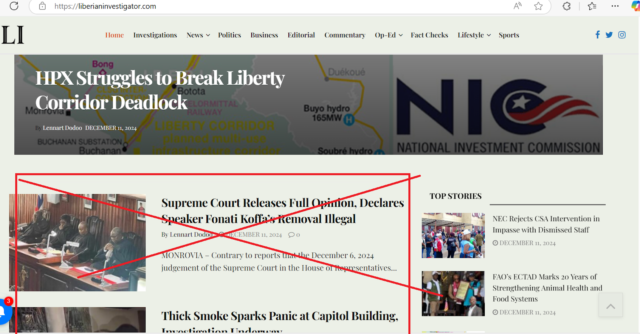
Claim: “Court says Fonati Koffa’s removal by the majority Bloc was unconstitutional and a flagrant violation of the house rulings.”
Source: The Liberian Investigator
Verdict: Misleading; the Supreme Court did not declare the removal of Speaker Kofa illegal by the majority bloc.
Full Text: The Liberian Investigator is an online news platform birthed about six months ago. A December 11, 2024, story with the byline of its publisher Lennart Dodoo titled “Supreme Court full opinion declares speaker Kofa’s removal illegal” states that contrary to reports that the December 6, 2024, judgment of the Supreme Court in the House of Representatives crisis was ambiguous and left the House in further chaos.
The paper published that “ the Court has finally released its full opinion in which it unequivocally states that Speaker Fonati Koffa’s removal by the majority bloc was unconstitutional and a flagrant violation of the House Standing Rules.”
Minutes after the story was shared in the WhatsApp chatroom, there were many reactions from colleagues criticizing the publication.
The Supreme Court is the final arbiter of justice in Liberia. The high court on 6th December handed down judgement on the “unconstitutionality of several actions taken by certain members of the House of Representatives.”
As of now, the outlet has taken down the post from its website.
Verification: we did a thorough review of the Supreme Court December 6, 2024, opinion delivered and the judgment of the Supreme Court. We found that the “Liberian Investigator” used one of Koffa’s prayers to the Supreme Court to build their stories making the public believe it was the judgment of the high court.
Our findings show that the Supreme Court only ruled on two cardinal issues out of the four counts petitioned by Speaker Koffa.
Firstly, whether or not the Supreme Court has the constitutional power to hear internal disputes arising from the legislature and the interpretation of articles 33 and 49 respectively. The court answered in the positive.
According to the Supreme Court interpretation of Articles 33 and 49, it unequivocally stated that where a simple majority is a sitting or lower member, in both cases a presiding officer, defined in Article 49 of the Constitution, is the Speaker, and in his/her absence, the deputy speaker.
The court went further to say that “this interpretation of the court regarding quorum and restrictions on the minority articulated in Article 33 of the Constitution is incorporated in Rules 7 (7.2), 8 (8.1), 12, and 13 of the House Standing Rules.
In a response in one of the chatrooms, the publisher said, “Oh yes, James, I removed it from the website. That’s what professionalism is about. We realized that the part of the court document we used for the story wasn’t the words of the court; rather, the court was restating Cllr. Johnson’s argument. So, we did the professional thing. Our work is to inform the people. We have no interest, absolutely, in distorting facts. What’s the issue?”
Conclusion: Based on our findings, we conclude that the claim made by the investigator is misleading. The Supreme Court ruling did not point out a single party as proceeding unconstitutionally or constitutionally.
Written by Watson Richards, Grant Fellow




